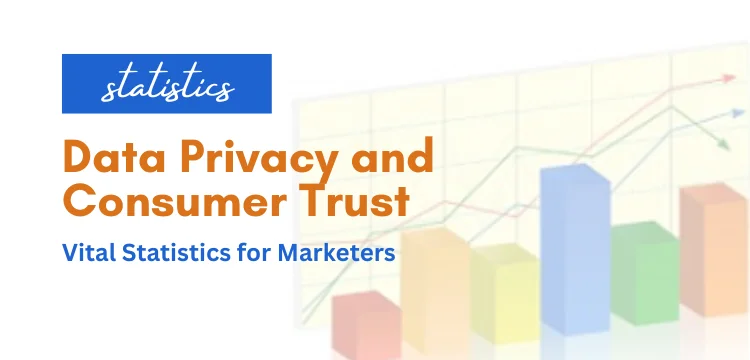Data Privacy and Consumer Trust: Vital Statistics for Marketers
Privacy concerns are growing; marketers know and need even more data to understand consumer sentiments to effectively build trust.
And it’s not surprising at all given that data has become the lifeblood of marketing.
It fuels the strategies that allow businesses to connect with their target audiences, better tailor their offerings, and ultimately thrive in a competitive environment.
However, a shift may be underway in how data-driven marketing works – one that revolves around the crucial nexus of data privacy and consumer trust.
With an abundance of awareness on the user side about the data breaches and digital intrusions that are increasingly prevalent, consumers are growing more vigilant about how their personal information is handled.
Consequently, marketers are faced with a delicate balancing act: they must harness the power of data to understand consumer sentiments and preferences, all while respecting and safeguarding individual privacy.
As hard as it sounds, here is a wealth of vital statistics that underscore the importance of data privacy in marketing.
Statistics on Data Privacy and Consumer Trust
1. Consumer Privacy Concerns:
- According to a survey conducted by Pew Research Center in 2021, 79% of adults in the United States were concerned about how companies were using their data.
- In a Deloitte survey from 2021, 79% of consumers indicated that they were more cautious about sharing personal information online compared to a year ago.
2. Impact on Brand Trust:
- An Accenture survey found that 64% of consumers around the world are annoyed by brands that fail to use personal data responsibly.
- The same Accenture survey revealed that 88% of consumers say that trustworthy handling of their data is crucial to their willingness to interact with a brand.
3. Data Breaches and Trust:
- According to the 2021 Cost of Data Breach Report by IBM, the average cost of a data breach globally was $4.24 million.
- The same report stated that it takes an average of 287 days to identify and contain a data breach.
4. Regulation and Compliance:
- The General Data Protection Regulation (GDPR), implemented in Europe in 2018, includes fines of up to 4% of global revenue for companies that violate its requirements.
- The California Consumer Privacy Act (CCPA) and the California Privacy Rights Act (CPRA) impose stricter privacy regulations in the state of California, affecting businesses that handle California residents’ data.
5. Consumer Attitudes:
- A Consumer Reports survey from 2020 indicated that 70% of respondents said they’d be more likely to use a product or service from a company they trust to protect their data.
- The same survey found that 65% of respondents agreed that they would be willing to pay more to ensure a company’s products or services protected their data.
6. Transparency and Consent:
- A survey by the Pew Research Center in 2020 showed that 72% of U.S. adults feel that all, almost all, or most of what they do online is being tracked by advertisers, technology firms, or other companies.
7. Importance of Personalization:
- In a SmarterHQ survey, 72% of consumers said they would only engage with personalized marketing messages.
8. Ethical Data Use:
- The Edelman Trust Barometer Special Report on Trust and Data Privacy (2021) found that 81% of consumers believe that companies should only use personal data to improve the quality of their products and services.
Conclusion
The interplay between data privacy and consumer trust is important, now more than ever before.
The statistics presented here paint a clear picture: consumers are increasingly concerned about how their data is handled, and this concern directly impacts brand trust and loyalty.
With stringent regulations in place and shifting consumer attitudes, marketers must prioritize data privacy as a fundamental tenet of their strategies.
By doing so, they can not only navigate the complexities of data privacy and consumer trust but also build stronger, more enduring relationships with their customers.
The after-effect of this will be the ensuring of success, one where no party will feel cheated.

